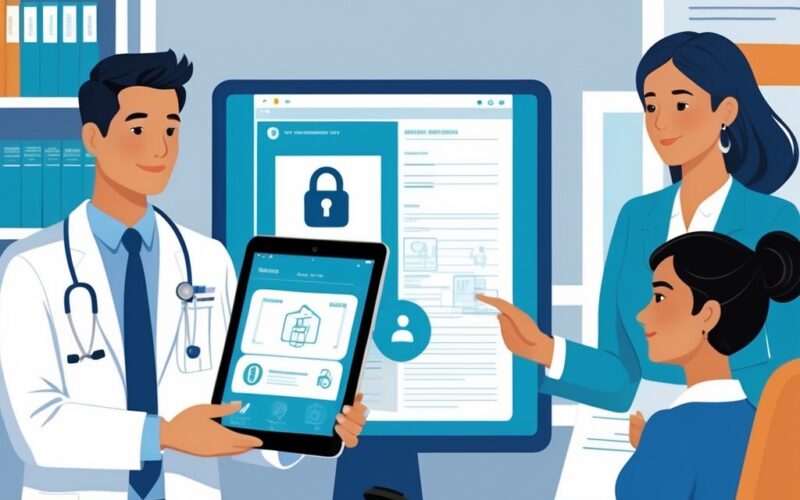Medical records laws in North Carolina aim to protect your personal health information and give you clear rights to access your own medical data. The state follows federal HIPAA rules and has its own statutes that tell healthcare providers how to handle, store, and share your medical records.
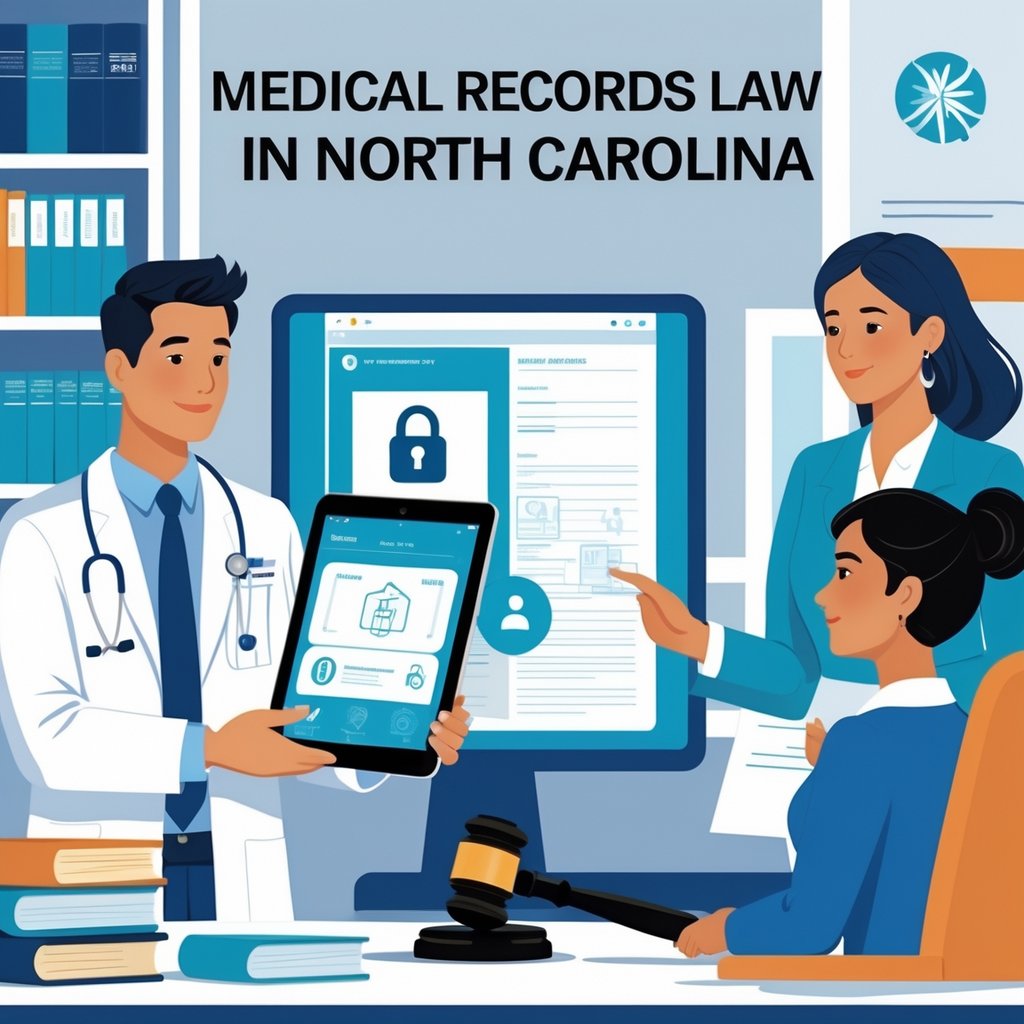
North Carolina General Statutes 90-411 gives you the right to get copies of your medical records from any healthcare provider. They must provide them within 30 days of your written request.
Healthcare providers can charge fees for copies, but state law limits how much they can ask for. This helps protect you from being overcharged.
Key Takeaways
- You can access your medical records in North Carolina within 30 days of a written request.
- Healthcare providers must keep your records confidential and can only share them with your permission or when the law requires it.
- State law regulates medical record copy fees and sets limits on what providers can charge per page.
Legal Definitions and Key Statutes
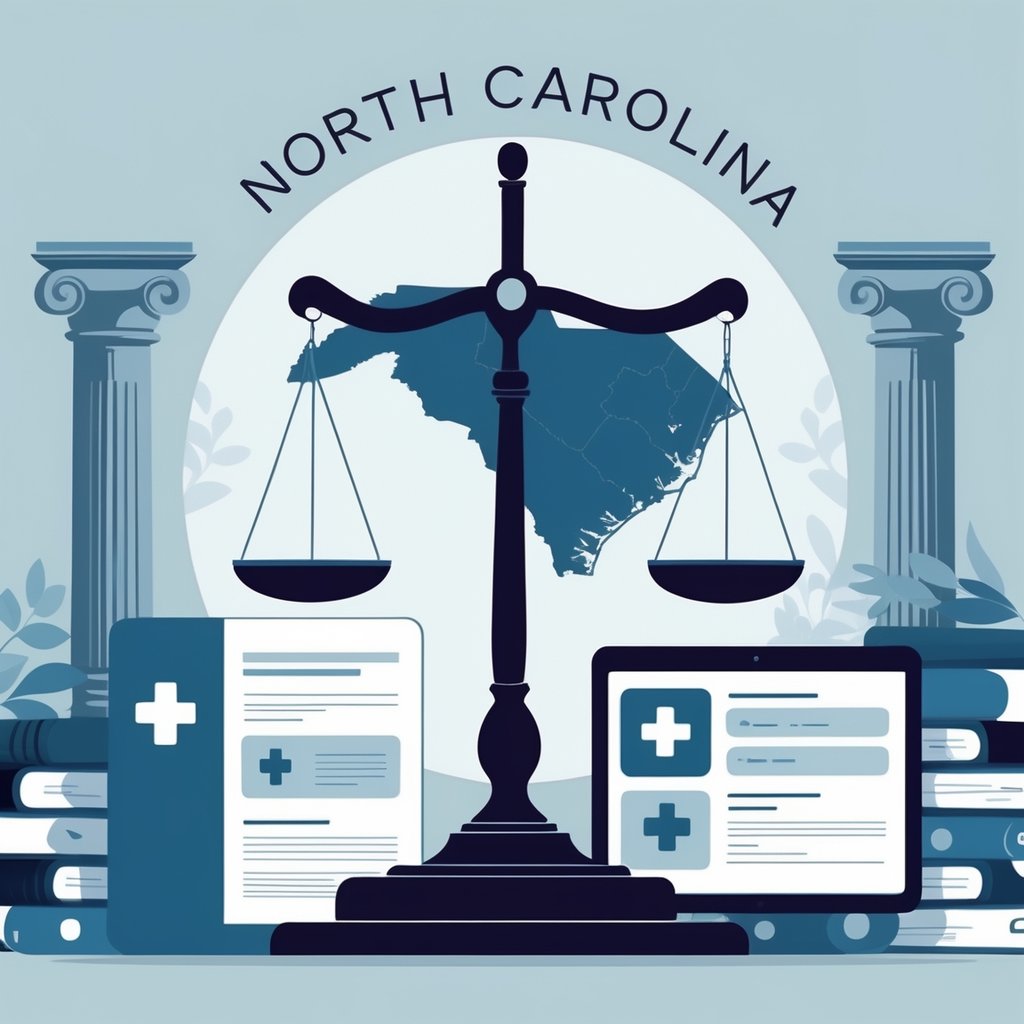
North Carolina General Statutes Chapter 90 Article 29 spells out what counts as medical records and who counts as a health care provider. These definitions shape your rights and the legal obligations of medical professionals.
Definition of Medical Records
Medical records include all documents with your health information created during your care. This means physician notes, test results, treatment plans, and diagnostic reports.
North Carolina law says medical records can be written or electronic. They must relate to your medical condition, treatment, or healthcare services.
Key components of medical records include:
- Doctor’s notes and observations
- Laboratory and imaging results
- Prescription records
- Treatment histories
- Surgical reports
Healthcare providers only need to give you existing records. They don’t have to create new documents if you ask for something that doesn’t exist.
Who Is a Health Care Provider Under NC Law
North Carolina General Statutes define health care providers pretty broadly. It covers many types of medical professionals and facilities.
Licensed professionals under Chapter 90 include:
- Physicians and surgeons
- Nurses and nurse practitioners
- Dentists and dental hygienists
- Pharmacists
- Physical therapists
Providers licensed under Chapters 90B and 90C are also included. These chapters cover more health occupations and specialties.
Healthcare facilities must be licensed under:
- Chapter 131E (hospitals and medical facilities)
- Chapter 122C (mental health and substance abuse facilities)
The law also covers representatives and agents of healthcare providers. Medical office staff handling your records fall under this too.
Relevant North Carolina General Statutes
Several statutes shape your medical records rights in North Carolina. These laws protect your privacy and ensure you can get your health information.
North Carolina General Statutes 90-411 lets you get copies of your medical records. Healthcare providers have to give you records within 30 days of your written request.
North Carolina General Statutes 90-21.2 protects the confidentiality of your medical information. This law treats patient records as privileged and says they can’t be disclosed without your okay.
Other statutes cover things like public health reporting. Providers have to report certain diseases to state health authorities.
Breaking these laws can lead to professional discipline and civil penalties.
Overview of Article 29
Article 29 of Chapter 90 focuses on medical records in North Carolina. This article lays out the legal framework for handling your medical information.
Article 29 defines who counts as a healthcare provider and what counts as a medical record. It sets rules for keeping, accessing, and protecting your records.
The article also covers fees for copying records. It works alongside federal HIPAA rules. When state and federal laws clash, the stricter rule usually applies for your protection.
Article 29 covers these areas:
- Patient access rights
- Confidentiality requirements
- Permitted disclosures
- Record retention periods
- Fee limitations
Access and Rights to Medical Records in North Carolina
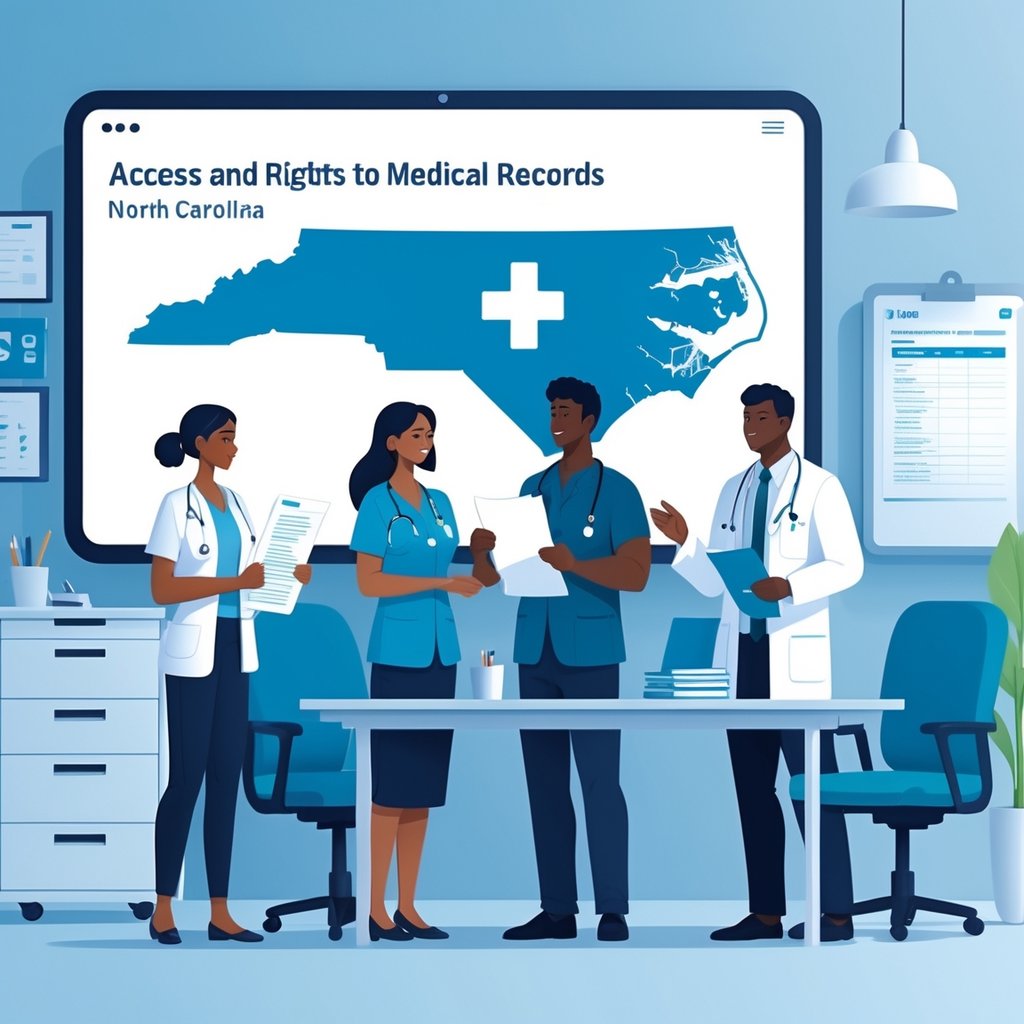
North Carolina law gives you the right to see your own medical records. Healthcare providers have to give you copies within 30 days of a written request.
Legal representatives can also access records for personal injury cases and workers’ compensation claims.
Patient Rights to Access
North Carolina General Statutes 90-411 says you can get copies of all your medical records, including physician notes, test results, and treatment plans.
Your healthcare provider must answer your request within 30 days. They don’t have to make new documents or summaries if those aren’t already in your file.
Special rules for minors:
- Parents can usually access their child’s records
- Records for reproductive health, mental health, or substance abuse may be restricted
- The minor must give written consent for those sensitive records
If you pass away, only certain people can get your records. The executor of your estate gets first dibs. If there’s no estate, your spouse or next of kin can request records with the right paperwork.
Requesting Copies of Medical Records
You have to ask for your medical records in writing. Phone calls or just asking in person won’t cut it under North Carolina law.
Your provider can charge fees for copies:
- First 25 pages: Up to $0.75 per page
- Pages 26-100: Up to $0.50 per page
- Beyond 100 pages: Up to $0.25 per page
Electronic records might have reasonable fees based on actual costs. You could pay more for rush requests or if records are in off-site storage.
You get free records for:
- Social security disability applications
- Workers’ compensation claims
- Viewing records in person at the provider’s office
Think you were overcharged? File a complaint with the North Carolina Medical Board.
Right of Access for Legal and Insurance Purposes
Legal reps and insurance companies also have access rights under North Carolina law. For personal injury cases, your lawyer can get your medical records with the right forms.
Workers’ compensation insurers have broader access when they pay for your care. They don’t need your consent to get records about your workplace injury.
Court orders and subpoenas can force providers to release your records. Judges sometimes review records privately first to protect your privacy.
Insurance companies paying for your treatment usually need your written okay. But in workers’ comp cases, they can get records directly if they’re responsible for your bills.
Your provider must still keep your information confidential, even when releasing records for legal reasons. Letting records out without permission can lead to penalties.
Record Copy Fees and Associated Costs
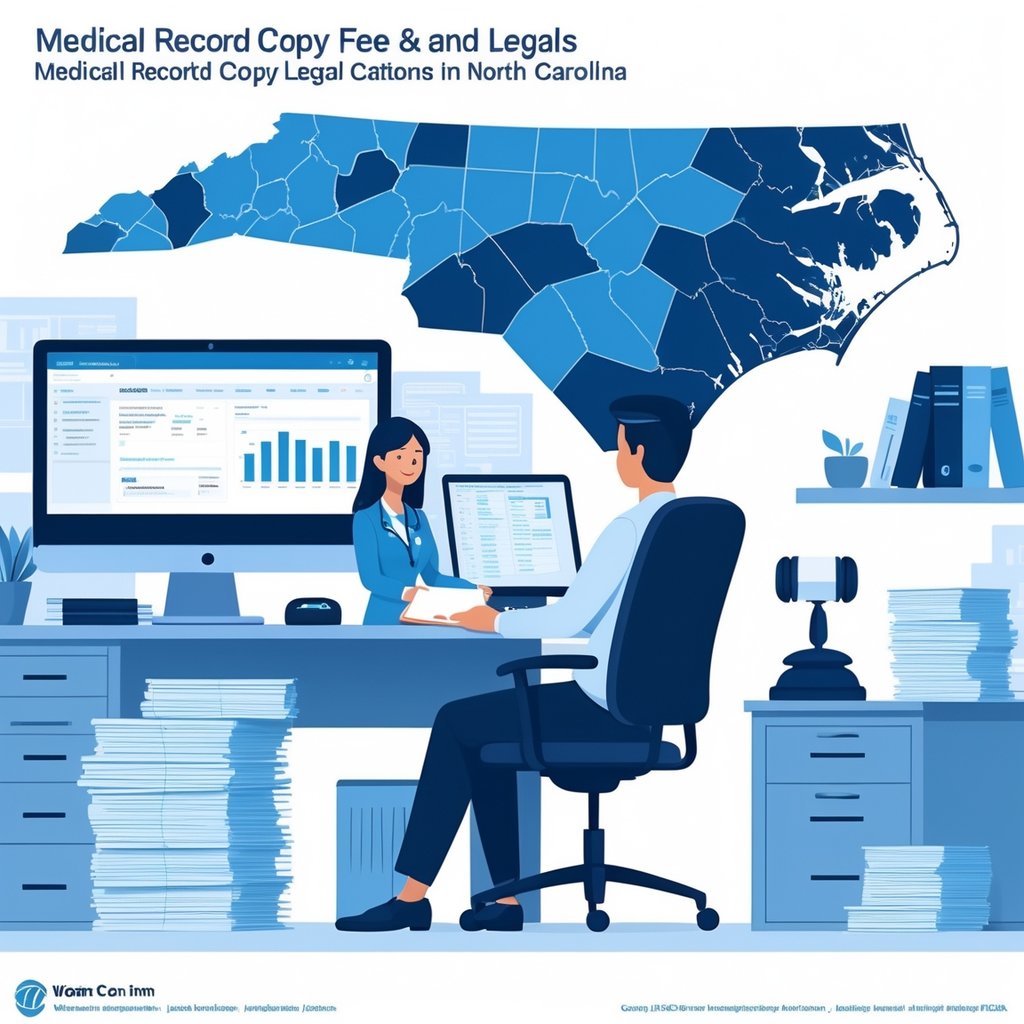
Healthcare providers in North Carolina can charge fees for copying medical records, but state law puts limits on these fees, especially for personal injury and disability claims. The fees should only cover real costs for searching, copying, and mailing your records.
Maximum Fees for Copies
North Carolina General Statutes § 90-411 allows providers to charge reasonable fees for searching, handling, copying, and mailing records. The law doesn’t set exact dollar amounts, but says fees must be reasonable.
Your provider can charge for:
- Searching for your records
- Handling the request
- Copying the documents
- Mailing the records
The fee should reflect actual costs. Providers can’t add on extras just to make money.
Special Charges in Personal Injury and Disability Cases
Special rules limit copying charges for personal injury lawsuits, social security disability claims, or workers’ comp cases. Providers must follow stricter fee rules here.
For social security disability, federal rules cap what providers can charge. They can’t charge for things like verifying or maintaining systems.
Personal injury attorneys usually pay lower copying fees when requesting records for lawsuits. Workers’ comp claims also get reduced fee structures.
Minimum Fees and Copying Costs
North Carolina doesn’t set minimum fees for medical record copies. Some providers might not charge at all for small jobs or simple electronic copies.
Copying costs can vary depending on the provider and the type of record. Paper copies cost more than electronic ones.
You might see different prices for:
- Standard paper copies
- Electronic files sent by email
- X-rays and imaging studies
- Lab results and test reports
Small requests usually cost very little. Big, complicated records can cost more because of the labor involved.
Use, Storage, and Retention of Medical Records
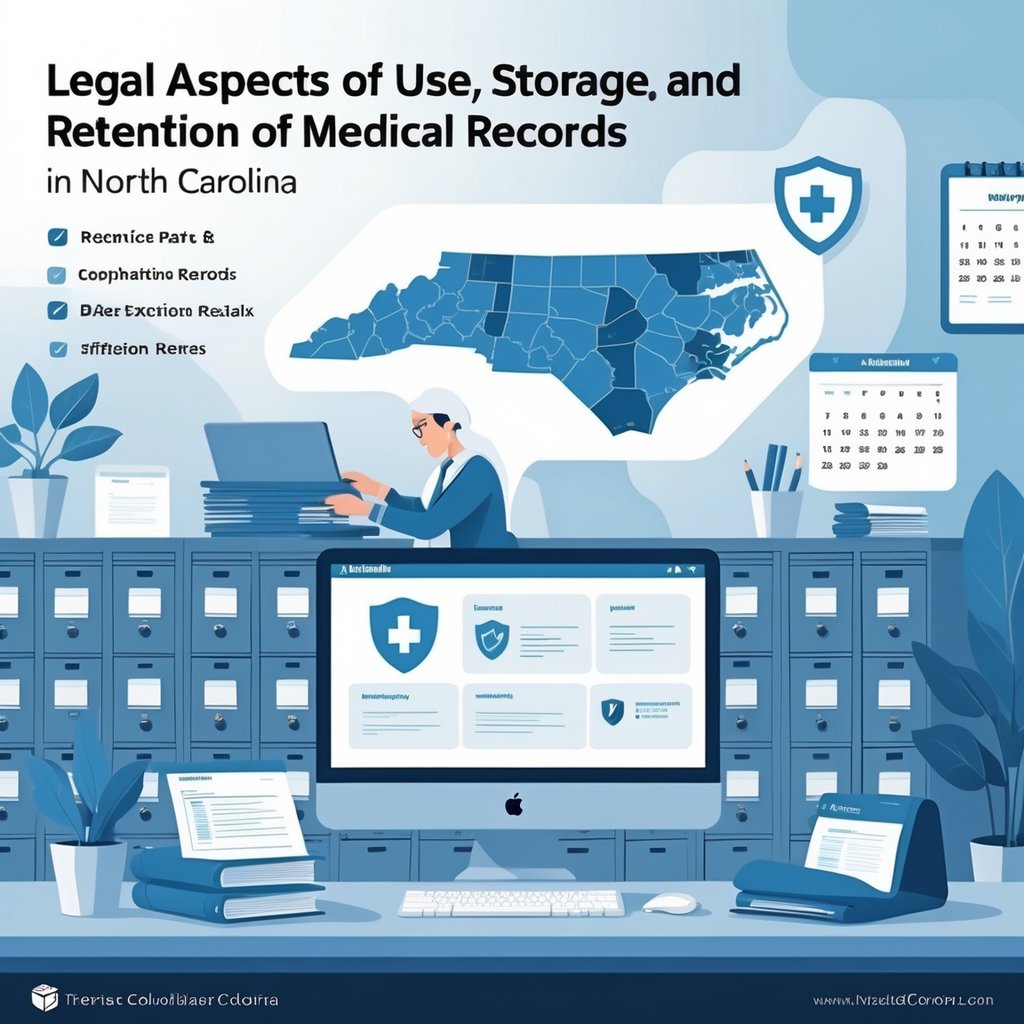
North Carolina expects healthcare providers to keep complete, accurate medical records and follow specific documentation standards. Medical records retention laws in NC require proper storage and set minimum retention periods for patient info.
Documentation Standards
Your medical records need to include certain details under North Carolina law. The NC Medical Board expects accurate documentation for every visit.
Required elements include:
- Reason for each visit
- Your complete medical history and exam findings
- Past medical history with updated problem lists
- Surgical history, family history, and social history
- Clinical decisions and treatment plans
- Current medications and allergies
- Documented informed consent when needed
Each page has to show your name or ID number. All entries should have the author’s name and date.
Your documentation must be easy to read. If handwriting is messy, notes should be dictated and typed up soon after.
For electronic health records (EHR):
- Don’t overuse template content
- Double-check all pre-filled info
- Make sure any “copy-and-paste” content is relevant
- Take responsibility for all clinical decisions
Retention Periods and Storage Requirements
You have to keep patient medical records according to both federal and state law. HIPAA sets a minimum retention period of six years at the federal level.
Storage requirements include:
- Keep records under your control
- Use solid security measures
- Dispose of records in a HIPAA-compliant way
- Tell patients about your retention policies
Think about patient healthcare needs when figuring out how long to keep records. Adult patient records usually need to be kept longer than the federal minimum.
Special considerations:
- Mental health records sometimes need to be kept longer
- Pediatric records often stay on file until the patient turns 18 or 21, sometimes longer
- Certain conditions might mean records must be kept even longer
Your storage system should let you get to records quickly for consultations, care transfers, or if your practice closes. If you store electronic records off-site, you need clear contracts with your vendors.
Proper Handling of Sensitive Information
You have to protect medical record confidentiality with solid safeguards. Only release records with proper written authorization or when the law allows.
Access requirements:
- Patients have strong rights to their records
- You need to release records quickly when asked
- Don’t withhold records because of unpaid bills
- You can charge reasonable copying fees
Mental health records and sensitive treatment info need extra protection. Don’t release records if it would put the patient or others in danger.
Third-party considerations:
- Have enforceable agreements to protect confidentiality
- Make sure both you and the patient can access records
- Follow all rules for subpoenas
- Give patients written policies about access and fees
You also need to give patients a chance to claim their records before disposal. Keep a good chain of custody for sensitive info.
Electronic Medical Records and Digital Compliance
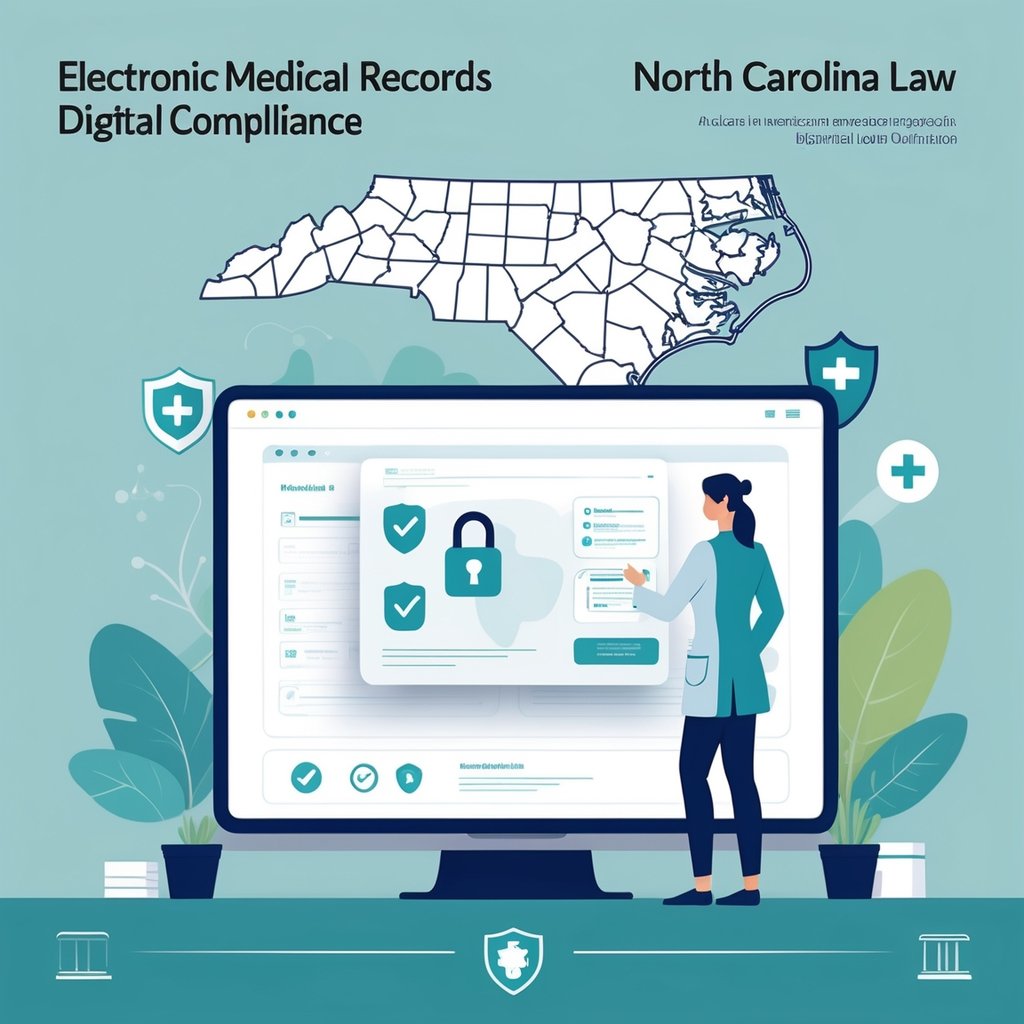
North Carolina lets providers and facilities keep records electronically. These systems have to meet strict requirements for authentication, security, and privacy under state and federal law.
Definition and Legal Status of Electronic Medical Records
Electronic medical records count as legal records in North Carolina. Any licensed provider or facility can keep records electronically.
You don’t need to keep paper copies if you use electronic systems. The law treats electronic records the same as paper ones.
Your electronic health record system has to meet the same standards as paper records. That means keeping info accurate, up-to-date, and complete for each patient.
The North Carolina Medical Board encourages using electronic health records. Still, you’re responsible for knowing your system’s limits and adjusting your practice as needed.
Make sure your electronic records support solid patient care. This includes letting professionals communicate and providing legal proof of care.
Authentication and Signature Requirements
Every entry in your electronic records needs proper author identification. That could be a handwritten signature, initials, or a unique electronic ID.
Each entry must have the date and author’s ID. You have to make sure transcription is accurate, especially if you use dictation software or AI.
Key Authentication Requirements:
- Author identification on every entry
- Date stamps for each entry
- Unique electronic IDs for every user
- Secure logins and access controls
Go easy on templates and pre-filled info. The Medical Board warns about using templates that carry old info forward without a real review.
Use “copy-and-paste” only if all the info is relevant to the current visit. Review and update everything to match the care you actually provided.
If you use AI in your records, you’re on the hook for AI recommendations. Document why you followed or ignored AI suggestions.
Security and Confidentiality Rules
Your electronic medical records must follow HIPAA requirements for privacy and security. These rules cover all electronic health info.
You need solid security measures to protect records. That means both technical safeguards and office policies.
Required Security Measures:
- Secure access controls and user authentication
- Encryption for stored and transmitted data
- Regular security risk checks
- Staff training on privacy
Make sure you can get to records quickly for consultations, transfers, or if your practice closes. The Medical Board has seen problems when providers lose access because of vendor disputes.
Your contract with EHR vendors should include record access provisions. This is especially true for cloud storage.
Let patients know about retention policies and how you destroy records. Destroy all electronic records in a HIPAA-compliant way when you no longer need them.
When patients use your portal, respond to their requests in a timely way. Set clear rules for electronic communication.
Special Considerations and Exceptions
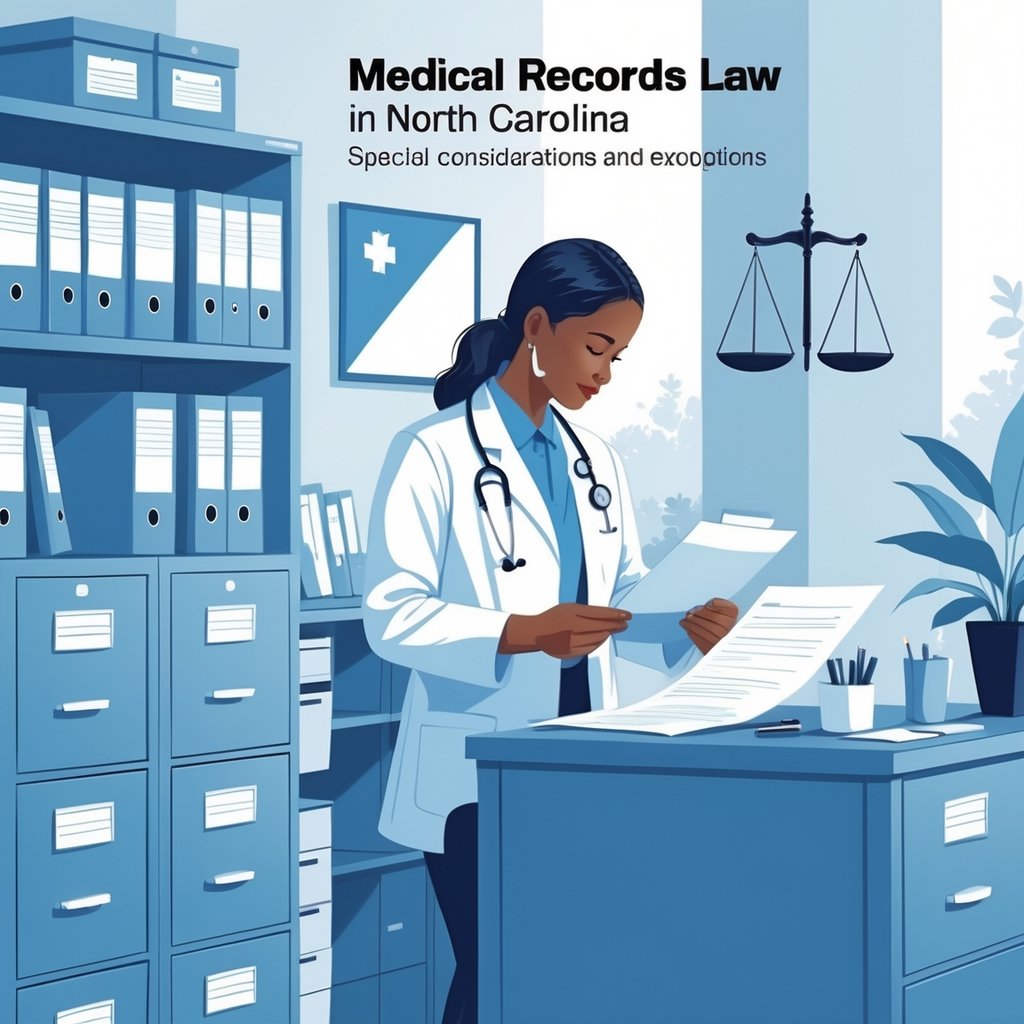
North Carolina has specific rules for x-rays, fetal monitor records, workers’ compensation cases, and Social Security disability requests. These situations often have different access, fees, or retention requirements.
Exclusions: X Rays and Fetal Monitor Records
X-rays and fetal monitor records follow different rules than other records in North Carolina. These items aren’t always included when you ask for your medical records.
Providers might charge extra for copying x-rays and imaging studies. The costs go up since these require special handling and equipment.
Fetal monitor strips and other continuous monitoring records sometimes have shorter retention periods. Providers may keep them for less time because of storage issues.
If you want x-rays or monitoring records, ask specifically for them. They don’t always come with other medical documents.
Digital imaging records like CT scans and MRIs might be given to you on CD or DVD. Some places charge extra for the discs and copying.
Special Rules for Workers’ Compensation
Workers’ compensation records work differently in North Carolina. If you’re dealing with a workplace injury, you have more rights.
Medical records for workers’ comp cases must be given to you at no cost. Providers can’t charge the usual copying fees for these.
Your employer’s workers’ comp insurance can see relevant records, but they need your written OK or a court order.
You can ask for fast processing of workers’ comp records. The time limit for providing them can be shorter than the usual 30 days.
Only records about your workplace injury or illness are shared. Anything else stays confidential.
Disability Determination Requests
Social Security disability claims have their own rules in North Carolina. These requests come with special fee and processing requirements that help applicants.
Medical records for disability claims must be given at no charge. Providers can’t bill you for copying when records are for disability determinations.
Tell your provider you need records for disability purposes. That way, they’ll apply the fee waiver.
The Social Security Administration can request records directly from your providers. You’ll need to sign authorization forms for this.
Disability-related records include treatment notes, test results, and doctor assessments. Mental health records and functional capacity evaluations are often crucial for these claims.
Frequently Asked Questions

North Carolina law says healthcare providers must keep records for certain periods and follow strict confidentiality rules. Patients can access their records, while providers have to follow HIPAA and state guidelines for handling and releasing medical information.
How can one obtain personal medical records in North Carolina?
You have the right to see and get copies of your medical records in North Carolina. HIPAA protects your rights to access and request corrections.
Healthcare providers must give you access when you ask. You can get copies no matter if they’re paper or electronic.
Your doctor has to respond to your request quickly. Medical records are confidential and only released with your written authorization.
Providers can charge a reasonable fee for copying. They can’t withhold your records just because you owe money.
What are the retention requirements for medical records in North Carolina?
Adult medical records must be kept for 6 years by providers. Children’s records must be kept longer.
Providers have to keep kids’ records until they turn 21. This protects minors who might need their medical history later.
Providers should let patients know how long records will be kept. When destroying old records, they need to follow HIPAA to protect your privacy.
You should have a chance to claim your records before they’re destroyed. Sometimes providers send them to another doctor instead.
What rules and regulations govern the handling of medical records in North Carolina?
HIPAA privacy rules set the main standards for handling records in North Carolina. The Privacy Rule gives you rights over your health info and limits who can see it.
North Carolina law says all patient medical records are confidential. Providers must protect your info from unauthorized access.
The NC Medical Board sets extra standards for doctors and other providers. These rules cover how records should be documented, stored, and shared.
Electronic records have to follow the same privacy and security rules as paper ones. Providers must keep your digital info safe.
How do state laws compare regarding medical records retention?
States have different rules for how long records must be kept. Some require longer retention than North Carolina’s 6-year rule for adults.
Many states use similar patterns with different rules for adults and kids. The idea is to let patients access their history when needed.
Some states base retention on the statute of limitations for malpractice cases. This protects both patients and providers legally.
Federal rules like HIPAA apply everywhere, but state laws can add more requirements. Providers have to follow both.
Under North Carolina law, what are the true statements about handling medical records?
Providers must keep accurate, complete records for every patient. Records should be easy to read and include key details about your care.
They can’t release your records without your written OK or a legal reason. Patient records in healthcare facilities are confidential.
You have the right to ask for corrections if you spot errors. Providers have to consider your request and make changes if needed.
Records for deceased patients are protected by HIPAA. Family members need the right paperwork to get those records.
What is the process for accessing old medical records online in North Carolina?
Most healthcare providers now use patient portals. These systems let you check your test results, visit summaries, and other health info.
You’ll usually need to set up an account with your provider’s portal. They’ll ask you to verify your identity before you can see your records.
Some older records might not show up online, especially if they came from before electronic systems. In those cases, you’ll have to reach out to the provider’s medical records department.
If your provider has closed or moved, things get trickier. Try contacting the new practice or whoever stores the records now.






